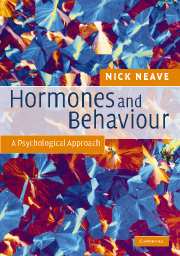Book contents
- Frontmatter
- Contents
- List of diagrams
- Preface
- Acknowledgements
- 1 Background to psychobiology
- 2 Hormones and the endocrine system
- 3 Behavioural endocrinology
- 4 Neurological effects of hormones
- 5 Typical sexual determination/differentiation
- 6 Atypical sexual differentiation
- 7 Neural differentiation
- 8 Reproductive/sexual behaviours
- 9 Attachment/parental behaviours
- 10 Aggressive/competitive behaviours
- 11 Sex steroids and cognition
- References
- Index
3 - Behavioural endocrinology
Published online by Cambridge University Press: 05 June 2012
- Frontmatter
- Contents
- List of diagrams
- Preface
- Acknowledgements
- 1 Background to psychobiology
- 2 Hormones and the endocrine system
- 3 Behavioural endocrinology
- 4 Neurological effects of hormones
- 5 Typical sexual determination/differentiation
- 6 Atypical sexual differentiation
- 7 Neural differentiation
- 8 Reproductive/sexual behaviours
- 9 Attachment/parental behaviours
- 10 Aggressive/competitive behaviours
- 11 Sex steroids and cognition
- References
- Index
Summary
Background
At its simplest level, behavioural endocrinology can be described as the scientific study of the relationships between hormones and behaviour. While the existence of hormones remained speculative, our scientific forebears certainly suspected that certain physical and behavioural characteristics were the result of some imbalance/irregularity of particular substances within the body. As we have seen in the previous chapter, such observations were normally medical in nature, i.e. certain physical ailments appeared to display characteristic symptoms, and the course of a particular ailment seemed to follow a set clinical pattern. Folk remedies were in place (with varying degrees of success), and, whilst understanding remained basic at best, and with sophisticated analytic techniques being several hundred years away, scientists used their powers of observation and deduction, and made some remarkable observations.
For example, goitre is an enlargement of the thyroid gland caused by a lack of iodine (recall from chapter 2 that the thyroid cannot manufacture its hormones T3 and T4 without sufficient dietary iodine). If a person's diet is low in iodine, the pituitary keeps sending TSH to the thyroid, and the gland swells, leading to an enlarged throat. The Chinese and the Romans had observed that entire districts could be afflicted by goitre (now referred to as ‘endemic goitre’ but once commonly called ‘Derbyshire neck’ after the common occurrence of this condition in the Peak District of Derbyshire).
- Type
- Chapter
- Information
- Hormones and BehaviourA Psychological Approach, pp. 48 - 68Publisher: Cambridge University PressPrint publication year: 2007



